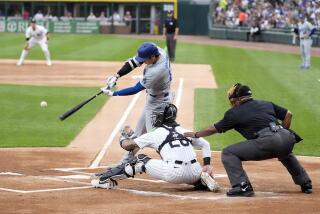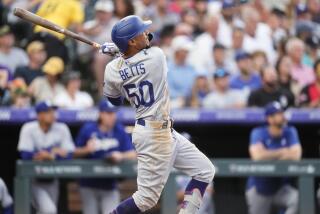NHL ALL-STAR GAME : Playing Favorites Is Nothing New
PITTSBURGH — The Boston Bruins weren’t surprised they were ignored by Montreal Coach Pat Burns in the selections for this weekend’s NHL All-Star game. Nor was New York Ranger Coach Roger Neilson, or New York Islanders center Bryan Trottier.
Favoritism has always been a fact of life in the selection of players by the All-Star coaches.
And this year isn’t any different.
“I don’t like the coach picking the balance of the team,” Neilson said. “We should pick them in order (of the voting) with a committee evaluating the situation. It puts too much pressure on the coach with his own team, and there’s also politics.”
The most dramatic case in point this year is Burns’ added selections for his Wales Conference team which will face the Campbell Conference in today’s 41st All-Star game at the Pittsburgh Penguins’ Civic Arena.
When Burns filled in his roster, he picked three of his own players--Stephane Richer, Shayne Corson and Chris Chelios.
The Bruins had two players in the starting lineup by virtue of the fans’ balloting--defenseman Ray Bourque and right wing Cam Neeley. None of the other Boston players were added to the Wales roster, even though the Bruins were leading the Adams Division at the time of selection.
Bourque felt the Bruins were ignored by Burns in a personal vendetta.
“I didn’t expect any of our players to get any favors from Pat Burns,” Bourque said. “Last year, the Canadiens were angry that (former Boston coach) Terry O’Reilly picked Bruins instead of Canadiens.
“Burns was just repaying the compliment and that’s understandable. But still, I thought at least one of our goalies (Rejean Lemelin and Andy Moog) deserved to be chosen.”
Trottier wouldn’t disagree. Nor would he dispute the fact that the coaches are biased in their selections.
“Unfortunately, there’s favoritism by the coaches,” he said.
The element of fans voting for the starting All-Star teams has been just as controversial. Some NHL coaches and players have complained that the fans don’t always select the best players, or the ones who are most deserving.
Example: Philadelphia’s Brian Propp, who was injured most of the season, yet was voted in by the fans as the starting left wing for the Wales Conference.
“The best system was before, when the Professional Hockey Writers Association chose the team,” said Mike Gartner, the Minnesota North Stars’ representative on this year’s Campbell Conference team. “Or the players themselves would probably do a better job. I don’t like the present system. It’s not fair.
“I’m not saying fans deserve no say, but it becomes mostly a popularity contest. The coaches don’t do much better, especially when they are trying to fill a deficiency at a certain position. They take their own players instead of other more deserving guys.”
Neilson is another who doesn’t care for the fans’ voting.
“It gets the fans into the game,” he said, “but it doesn’t always get the best players. They have to find some way to prevent stuffing ballot boxes. We need a better system. It’s nice to get fans involved, but . . . “
Trottier is ambivalent about this aspect of the All-Star situation.
“It becomes a popularity contest--some areas fill out more ballots,” he said. “But it’s good to get the fans involved. The more they vote, the better chance for their teams.”
As for the rule that every team must have All-Star representation, there is generally no argument about that.
“The format has always been that way (with each team being represented) and it’s very popular,” Trottier said. “The TV networks need it, it gives exposure to all areas.”
More to Read
Go beyond the scoreboard
Get the latest on L.A.'s teams in the daily Sports Report newsletter.
You may occasionally receive promotional content from the Los Angeles Times.






